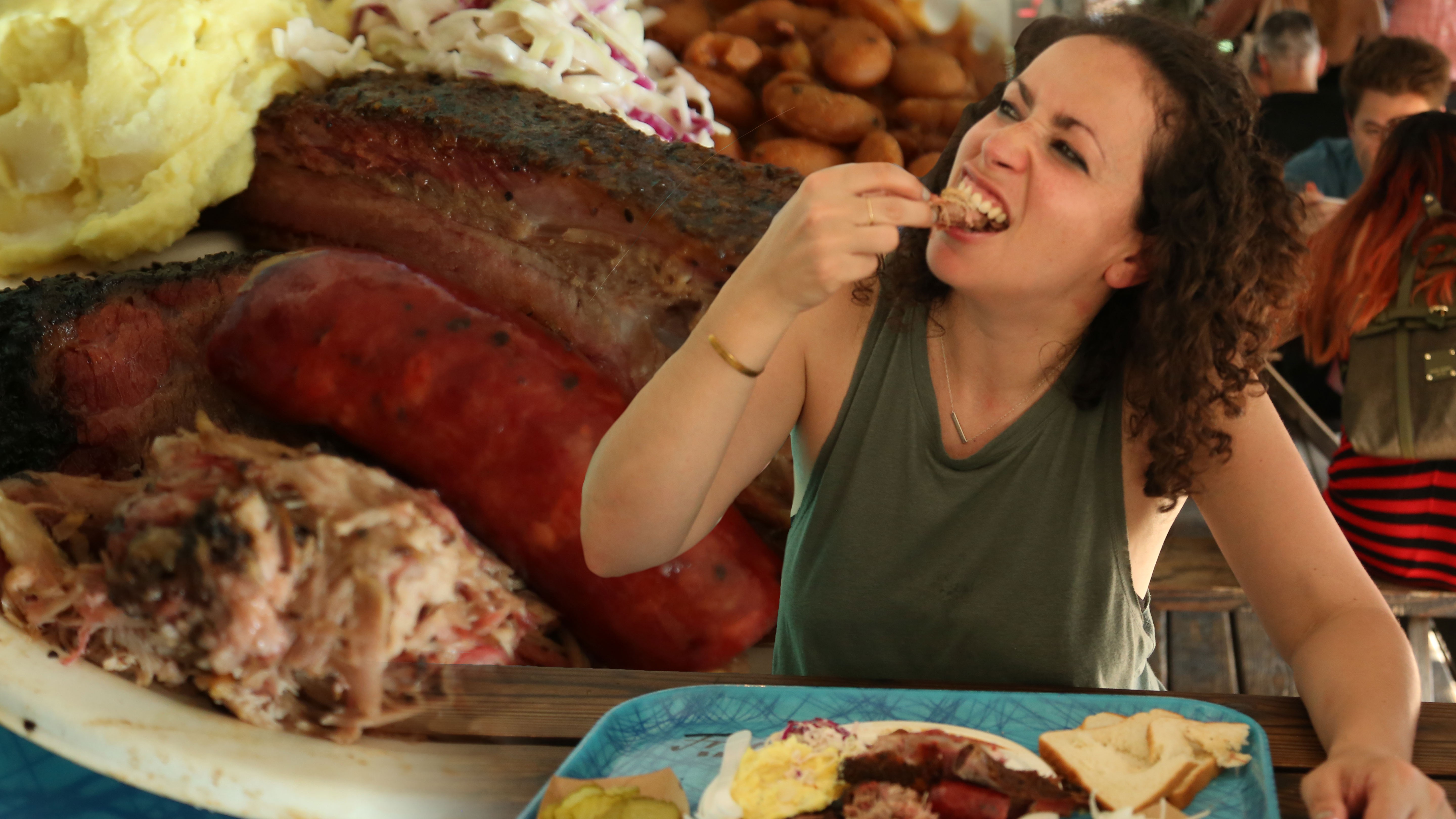The Hill Country Food Park in downtown Brooklyn seems to have been designed to make Austinites hallucinate.Its five food stalls are almost cartoonishly bucolic; dripping in bright Southern pastels, circling around a clutter of tables and barstools, just like the chirpy food trucks—and their ultra-focused concept menus—found in the backyards of East Side bars all over Texas’s capital city. The names of the stalls themselves are full of winky references for those in-the-know: South Congress (named for the touristy thoroughfare that juts over the Rio Grande river) serves the breakfast tacos and donuts; Nickie's does the Tex-Mex chili and cotija-sprinkled nachos; and the company's two parent brands, Hill Country Barbecue and Hill Country Chicken, roll out the butcher paper for dreamy, juicy, Central Texas-style smoked meats. I was there on a dreary Sunday afternoon, a time when the majority of Austin was surely sucking down a Mexican Martini under that endless blue sky. So, even as a fatty piece of brisket melted in my mouth, and even as the yellowed, AM-radio country jaunted through the Sonos system, there was never any doubt that I was in New York, surrounded by people living their New York life. At the very least, owner Marc Glosserman knows what he's up against.
Advertisement
"It's such a delicate subject. On one hand, there's nothing that gives me greater satisfaction than when a Texan walks into our restaurant and compliments us. I tell our team, 'If they compliment our food or our hospitality, we've done our job.' But at the same time, there's just gonna be haters," he explains. "With Texas, there's a piece of the culture that wants to keep things… if not in Texas, [then] at least preeminent in Texas. There's a sense of flattery when people take notice of Texas cuisine, but at the same time, there's a feeling of, 'You know what, you New Yorkers, you have everything.' So I think it's very hard to get the approval of Texans, particularly remotely. That's always been a challenge, we've always been beaten up a little bit."
Photo by Bill O'Leary/The Washington Post via Getty Images
Glosserman's bona fides are unimpeachable. He grew up in Washington, DC but his roots are deeply steeped in Central Texas. (His grandfather even served as the mayor of Lockhart; the Texan BBQ nerve center 40 minutes outside of Austin.) Hill Country Barbecue, and its sister restaurants, are a tribute to that culture; to Longhorn football, to sweltering, Lonestar-drenched nights on Red River, to the monotonous idyll of life in one of America's last slacker utopias. In 2019, though, you no longer need to wait for a bachelorette party or a SXSW panel for an invitation to the wonderland—bits and pieces of Austin are filtering out across the country, all built by the city's diasporic sons and daughters.
Advertisement
Hill Country Barbecue is the main event. Since Glosserman opened the first restaurant in 2007, the brand has become interconnected and multi-level like a hickory-smoked Disney World. There's Hill Country Barbecue in New York and DC, a Hill Country Chicken in Manhattan, the Hill Country Food Park in Brooklyn, a pie shop, and even a concert calendar that books a variety of rockabilly, alt-country, and bluegrass acts (just like Austin's Stubb's Amphitheatre, the premiere combination BBQ-pit-and-soundstage).
But walk down Wall Street in the early morning, and you'll also find the King David Tacos stand and its unfussy menu of Austin-style breakfast tacos (bacon, potato, egg, and cheese; chorizo, potato, egg, and cheese; you get it). King David's owner, Liz Solomon, was born and raised in Austin, and worked in advertising in until her late father convinced her to join the food industry."I had been let down by different breakfast tacos [around New York,] and we were very cautious of not wanting to make the same mistakes our forefathers did," she says.Out west in Los Angeles, mashed between the coffee shops and Money Trees of Sunset Boulevard, lays Homestate—perhaps the most nakedly "Austin-themed" eatery in the world. The walls are lined with bottles of Topo Chico; the taco menu cribs its names from the major streets in the city (which in turn, take their names from rivers around the state). A hunk of rusted sheet metal hangs over the bar, embossed with the words, "Welcome Home." The restaurant’s matriarch, Briana Valdez, immediately relates with Glosserman's tribunal anxieties about serving Austin food in a hostile city.
Advertisement
Photo by Wonho Frank Lee, courtesy of Homestate.
"It was crippling. The fear of coming out of the gates and immediately losing the entire Texas contingency. One of the toughest things at opening was that our queso wasn't good," she says. "We were opening the doors and we hadn't gotten the queso recipe right. My dream has finally come true, all these miracles had happened, I did everything I had to do, except probably the most important thing, which was the queso. It would keep me up at night, until one day we figured it out."Night terrors over subpar queso: a uniquely Texan misery.
There is also the partnership between Matt Davis and James Barrington in Seattle. Wood Shop BBQ started as a food truck, and today it has a brick-and-mortar location in the center of the city. Every aspect of the infrastructure is dogmatic about the Austin religion; from the smoldering jalapeno mac 'n cheese, to the breakfast tacos, and the imported hickory chips. (Their smoker was even built in the Central Texas suburb Dripping Springs.) The only caveat to its authenticity is that Davis and Barrington are not Texan, and instead speak like two men who've fallen hard for Austin's spell. Together, they make frequent "research trips" to the city, which inevitably involves them eating through the weekend and camping out for Aaron Franklin's morning brisket. After they're finished and full, they take a pocket of paradise back to the Pacific Northwest drizzles of King County."[Austin] feels like everyone is a little younger, and everyone makes about $150,000 a year, and they want to spend it on food. And nobody works, by the way."
Advertisement
"[Austin] feels like everyone is a little younger, and everyone makes about $150,000 a year, and they want to spend it on food. And nobody works, by the way," says Barrington, when I ask him to explain the appeal. "Everyone just sits outside on a hot day with a cold beer and eats tacos. I don't know how that works, but it works."Each of these businesses do the careful work to ensure that they'll never be called, flatly, a "Texas-themed" restaurant. Sure, every strip mall in America is home to a Texas Roadhouse, where suburban families dine on enormous steaks under the watchful gaze of mounted steer heads. But Austin’s bohemian glamour and chicness—the giddy half-drunk id that Barrington talks about—is unique to the city, not the state as a whole. Rich, liberal, and well-fed, with a long list of eager suitors and investors, it manages to keep a very Southern and divey image when night falls and the streets open up.
It is the same paradox I noticed when I, a Californian, moved to the city in 2010 to attend the University of Texas. I'd walk into Emo's and be greeted by a sea of cowboy boots; the exact sort of thing I feared most when I left the coast. Didn't matter, though, because we were all there to see an indie rock band like Deerhunter, and the gentle airbrushing of Texan identity on a city that, in most other ways, found a sense of pride in its contrasting politics with the rest of the state became charming and palatable. The globalist Texas, the Amazon Texas, the Diet Coke of Texas—according to Glosserman, that may be the only Texas that people outside of Texas want."I've heard it said so many times that Austin is one of the few places that New Yorkers and Californians can feel at home."
Advertisement
"I've heard it said so many times that Austin is one of the few places that New Yorkers and Californians can feel at home," he says. "There's a certain kinship there. From a lifestyle perspective, there are so many things appealing about Austin. It has its own sense of culture that so many other cities lack."
Photo courtesy of King David Tacos
"I'd be lying if I said that 'Austin' wasn't part of our gig or didn't give us any cool points," adds Solomon, of King David Tacos. "The one easy answer is that it's more progressive than other cities in Texas, and I think there's common ground with other cities. [Something like Hill Country] is not a caricature of Texas, and I guess the thing is that caricature does exist in a lot of places, but not necessarily in Austin." The emanation is inevitable, really. Austin's population continues to spike, with more and more tech conglomerates opening up campuses in the city, sending an ever-rising tide of disciples back to the rest of the world, preaching the good word about breakfast tacos, kolaches, and half-pounds of melt-in-your-mouth brisket. The lifestyle in the city is absurdly brandable, so it's no surprise that the corners of America are taking notice.The only remaining roadblocks are Texans themselves. They are a charmingly aggrieved nation, eager to throw hands about the superiority of their grocery stores, their burger joints, and their mineral water. It is difficult for me to imagine them letting such a cherished part of the local cuisine drift to the coasts without a fight. Valdez, on the other hand, wants to put those fears to rest. Austin food should thrive everywhere, she says, as long as Austin remains the Mecca."[Our food] has existed in its own framework for so long, but I'm so happy to see it gain notoriety and a place at the table, and to me that's the honor we have at Homestate. We get to share that with people, and to understand that it has its origins and its roots. That's like all food," she says."My parents are like, 'Why are you doing this? There must be breakfast tacos everywhere,' but there aren't! I think the best thing we can do—by taking it outside of Texas, it’s showing it in its best light."
The emanation is inevitable, really. Austin's population continues to spike, with more and more tech conglomerates opening up campuses in the city, sending an ever-rising tide of disciples back to the rest of the world, preaching the good word about breakfast tacos, kolaches, and half-pounds of melt-in-your-mouth brisket. The lifestyle in the city is absurdly brandable, so it's no surprise that the corners of America are taking notice.The only remaining roadblocks are Texans themselves. They are a charmingly aggrieved nation, eager to throw hands about the superiority of their grocery stores, their burger joints, and their mineral water. It is difficult for me to imagine them letting such a cherished part of the local cuisine drift to the coasts without a fight. Valdez, on the other hand, wants to put those fears to rest. Austin food should thrive everywhere, she says, as long as Austin remains the Mecca."[Our food] has existed in its own framework for so long, but I'm so happy to see it gain notoriety and a place at the table, and to me that's the honor we have at Homestate. We get to share that with people, and to understand that it has its origins and its roots. That's like all food," she says."My parents are like, 'Why are you doing this? There must be breakfast tacos everywhere,' but there aren't! I think the best thing we can do—by taking it outside of Texas, it’s showing it in its best light."

